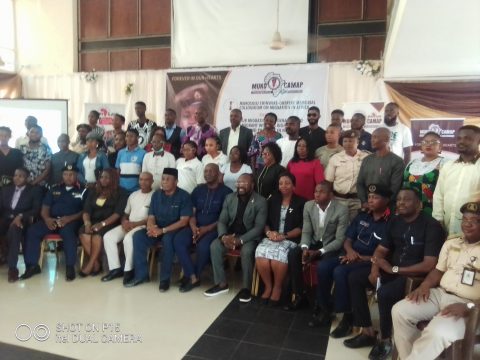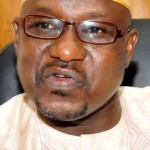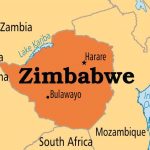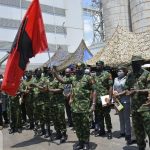Afrilaw, University Don, Want FG’s Approval, Implementation Of National Policy On Labour Migration
Latest Headlines, News Across Nigeria, News From The State Friday, March 11th, 2022
(AFRICAN EXAMINER) – An Associate Professor in Developmental Psychology, at the Nnamdi Azikiwe University (UNIZIK) Awka, Anambra State, Chiedozie Edwin Nwafor, and a non- governmental /human Rights organization, African Law Foundation (AFRILAW), have harped on the need for the enthronement of a sustainable orderly, safe, regular, and responsible migration policy in Nigeria.
The University Don and organization, equally posited that so long human race exist, mobility among people and issue of migration would remain inevitable in Africa and elsewhere.
Our Correspondent reports that Nwafor, who is also the Deputy Director, Centre for Migration Studies, UNIZIK, stated this Thursday in Enugu, while Delivering a keynote paper at the 1st Mukosolu Chinwike – Okereke Memorial Colloquium aimed at promoting dignity, safe, and orderly migration in Africa.
The Colloquium was put together by (AFRILAW), in partnership with National Human Rights Commission (NHRC) and the Nigeria Immigration Service NIS, to mark the 2nd year remembrance of the death of Late Mrs. Mukosolu Uzoamaka Chinwike, Okereke, who was until her sudden demise in March 2020, a Senior Immigration officer, and wife of Barrister Chinwike Okereke, Founder/CEO of Afrilaw.
Professor Nwafor, said “We are in an era of unprecedented mobility, and the need to facilitate orderly, safe, regular and responsible migration and mobility is becoming increasingly relevant.
“The need to face the challenges and to maximize the opportunities that this mobility brings has been recognized with the inclusion of migration in the 2030 Agenda for Sustainable Development, which highlights the positive contribution of migrants to inclusive growth and development.
According to him, “Migration is integrated in a number of Sustainable Development Goal (SDG) targets, such as ending modern slavery and addressing the vulnerability of migrant workers.
“However, the central reference to migration in the SDGs is Target 10.7 on facilitating “orderly, safe, regular and responsible migration and mobility of people, including through the implementation of planned and well‐ managed migration policies.
He noted that the international migrants in the labour force are commonly referred to as “migrant workers, adding that 2000 report and 2020 Estimated number of international migrants to
150 million 272 million.
“Within Africa the number of labor migrants have doubled over the last ten years. For instance, the figure increased from 7.5 million in 2008 to 14.4 million in 2017: an increase of 91.7 per cent.
“It is important to note that the incorporation of Target 10.7 into the 2030 Agenda created the need to define “planned and well‐ managed migration policies.
“Therefore, in 2015, the International Organization for Migration (IOM) developed the Migration Governance Framework (MiGOF).
“This Framework offers a concise view of an ideal approach that allows a State to determine what it might need to govern migration well and in a way that suits its circumstances.
“Following the UN adoption of the IOM MIGOF, most African countries including Nigeria has since reviewed their national migration policy to agree with the international requirement.
“The only thing left is full enactment in national law and practice of the relevant international standards. This is where CSOs like African Law Foundation (AFRILAW) has a great role to play:
“Championing the needed advocacy and sensitization for full enactment in national law and practice of the relevant international standard.
“Labour migration in Africa is largely intra-regional (80%) and mainly characterized by the migration of low-skilled workers. Of great importance in the region is the consolidation of significant South-South migration corridors to neighboring labour markets in the search for a job and better wages.
“Our duties as advocacy group should include Stepping up sensitization that will discourage all forms of irregular migration Evaluating the existing larbour migration policies.
In his emotional speech, AFRILAW boss, Barrister Okereke, said the Colloquium was organized in remembrance of the “uneventful demise of my late adorable and amicable wife, Late Mrs Mukosolu Uzoamaka Chinwike-Okereke.
He disclosed that “until her demise on Tuesday March 10, 2020 was a devoted, dedicated and hardworking wife and officer of the Nigeria Immigration Service (NIS) Enugu State Command with a rank of an Assistant Superintendent of Immigration officer .
“During the 1 year Remembrance of my late wife, I set up and launched on March 14, 2021, the Mukosolu Chinwike-Okereke African Migration Advocacy Project (MUKOCAMAP) as a regional advocacy initiative of African Law Foundation (AFRILAW) to honour and promote her legacy, dedication and passion as an Immigration Officer.
“The aim and strategic objective of MUKOCAMAP is to advocate and promote dignified, safe and orderly migration and promotion of the rights of Migrants, Refugees, Asylum Seekers and Internal Displaced Persons (IDPs) and their wellbeing toward a better African society.
” Under the initiative, we have our first activity , organized CSOs/MEDIA Roundtable to celebrate the 2021 World Refugee Day which was held on June 21, 2021 at AFRILAW Conference Room.
“The Memorial Colloquium on Migration in Africa is the 2nd activity we are organizing under the initiative, and it will be an annual event for the remembrance of my late dear wife.
According to him, “The 2022 Mukosolu Chinwike-Okereke Memorial Colloquium on Migration in Africa is organized with the aim and strategic objective to advance social and economic development through public policy dialogue on labour migration governance issues and promotion of the rights of migrant workers and their families in Nigeria.
“The Theme of today’s event is “Labour Migration Governance and Migrant Workers Rights: Policies and Practices in Nigeria”. International migration has become a major aspect of international economic relations and an important component of a globalized world.
“In recent years, the positive links between migration and development have been receiving increasing attention. At the same time, migration has been posing a number of challenges for Africa in general and Nigeria in particular, raising concerns over skills drain, discrimination and social exclusion.
Okereke noted that “Migration is a vital economic and social feature of Nigeria. As a country of origin, transit and destination, Nigeria has benefited and can benefit from labour migration, but this potential is not yet being fulfilled.
“Dissatisfaction with general socio economic conditions in the country and high unemployment rates have increased migration from Nigeria, especially among young, educated persons – traditionally males and increasingly females – in search of employment opportunities within and outside the continent, some towards the Middle East and the United States, others across Europe, the Americas and Asia.
“Nigeria has lost some of its best brains to labour migration and is spending huge amounts on hiring foreign experts.
“At present, Nigeria has no formal structure to aid nationals migrating to other countries; people are left to decide on their own to emigrate to escape economic hardship.
“Many migrate in risky and unsafe travelling conditions and, on arrival, often can obtain only low-skill, low-paying jobs.
” In addition, migrants are often poorly informed, or misinformed, about the conditions governing entry, work, residence, skills required, cultural issues, and their rights and obligations in destination countries, stressing that many women and children are trafficked and lured into commercial sex work and exploitative forced labour.
” Yet, irregular migration and trafficking thrive because so many people, particularly women and children, are disempowered and vulnerable. Pre-departure training and counseling can help prepare migrant workers to enter the labour market and be integrated into a new society.
He said “Most Nigerian labour migrants travel under private arrangements, thus protection against scams and bogus agencies needs to start at home.
“This ensures that recruitment agencies do not exploit the ignorance and vulnerability of potential migrants by charging exorbitant fees.
“Since most migration is for employment, there was a clear need for a comprehensive national policy on labour migration, situated within the framework of national laws, national migration policy and relevant international conventions.
“Such a policy aim to regulate and provide data on the movement of citizens into and out of the country. In addition, it would provide for the protection and welfare of nationals who choose to become migrant workers, taking into account the uprooting that their migration entails, along with the difficulties of relocating in a foreign country.
” It would also ensure that immigrants into Nigeria are qualified to take available jobs and are treated equally and fairly, and that the country will not lack the same skills provided by foreigners when its own qualified citizens leave. However, Nigeria has ratified both the Migration for Employment Convention, 1949 (No. 97) of the ILO in 1960 and the International (UN) Convention on the Protection of the Rights of All Migrant Workers and Members of Their Families, 1990, in January 2009.
“Some of the legal standards in these instruments have been incorporated into national legislation; but more work is needed to fully “domesticate” these norms to provide a sound national legal foundation for labour migration policy and practice.
“In 2014, Nigeria developed the National Policy on Labour Migration which was reviewed in September 2021, and it is yet to be approved by the federal government.
“I do hereby call on the federal government to approve the National Policy on Labour Migration and ensure its full implementation.
The solemn event which attracted several dignitaries, including Retired and serving Immigration officers, other Para Military personnel, members of Civil Society groups, Non- governmental organizations, NGOs, the Media, amongst others, also witnessed the presentation of a documentary on the life and times of late Mrs. Okereke.
Related Posts
Short URL: https://www.africanexaminer.com/?p=74664






















